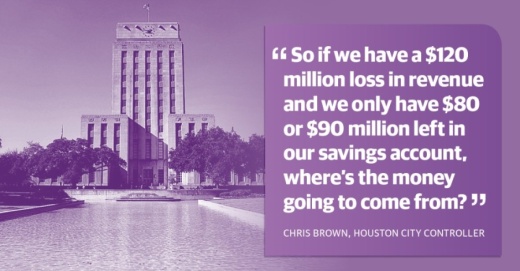Brown’s annual trends report presented May 20 suggested that Houston’s savings could dip to a historic low of 2.1% of maintenance and operating expenses by the end of Fiscal Year 2020-21, falling well below the 7.5% threshold required by city financial policies. The balance can dip below 7.5% only in the event of economic instability beyond the city’s control, the policies state.
“I don't like having this talk about disastrous financial consequences for the city,” Brown said. “But I feel like if we don't have it now, in 12 or 18 months, we're going to be having the same meeting and you all are going to say, ‘why didn't you tell us that it could be this bad?’”
Brown’s projection of the city’s $45 million ending fund balance, a de facto savings account for the city, is $108 million lower than the projection used by the city's finance department to form the proposed FY 2020-21 budget, which already calls for 3,000 furloughs and other cost-saving measures.
The finance department’s projections place the ending fund balance at 7.15%, 5 percentage points higher than Brown’s prediction. Overall, Brown's figures show general fund revenues $88.5 million less than what the administration's proposal anticipates.
During last year’s budget cycle, which was marred by a different financial crisis brought on by the city’s ongoing firefighter pay raise dispute, Brown’s projection of the ending fund balance was just 0.9% percent lower than the city’s projection.
For FY 2020-21, Brown’s predicted loss of 9.96% sales tax revenues due to coronavirus shutdowns, the oil downturn and a slowing economy is the main driver of the fund balances’ losses, he said. The mayor's proposal used an assumption of a 0.74% decrease in sales taxes.
An estimate halfway between his and the city’s finance department, Brown said, would put the fund balance at $80 to $90 million total, leaving little room for additional losses in the next year, when property tax declines will be felt more acutely.
“If we see a 10% decrease in property tax revenues, that would be $120 million reduction,” he said. "So if we have a $120 million loss in revenue and we only have $80 or $90 million left in our savings account, where's the money going to come from?”
A budget hearing is slated for June 3 and a vote by City Council is expected June 10.





